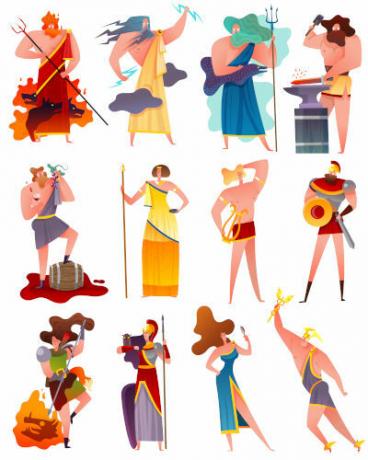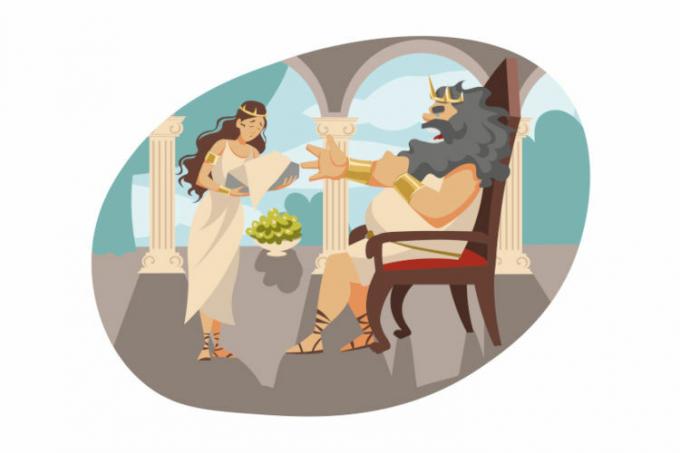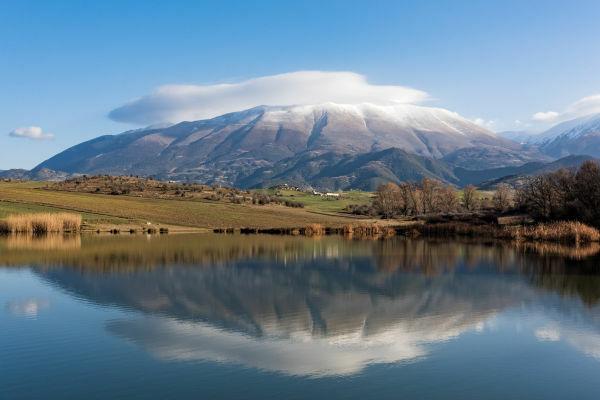You godsgreeks they were deities that were present in the religion of the ancient Greeks, being used to explain the phenomena of nature and human life. They were immortal, but had human form and feelings very common to humans. The main god for the ancient Greeks was Zeus, god of lightning.
Accessalso: Norse Mythology — The Religious Belief of the Vikings
Characteristics of the Greek Gods
the greek gods were part of the religion of the inhabitants of Ancient Greece. As the Greeks were polytheists, their religion had a wide variety of deities in its pantheon (set of gods of a people). The gods were immortal beings that represented the forces of nature or abstract concepts such as love and justice.

The main gods of the Greek pantheon resided in a place calledmountOlympus. At the top of this mountain, there was a palace that served as an abode for these gods, although many of them also had a home in other places, such as Poseidon, a god who also resided at the bottom of the seas.
Despite being deities and immortals, the greek gods had human form and possessed qualities and defects like any human being. Thus, they could feel jealousy, hate, envy, compassion, and could even fall in love. Furthermore, they intervened directly in the lives of human beings, often relating to them lovingly.
Mount Olympus, in addition to being an abode, was the place where the gods gathered to hold their festivals. They fed on ambrosia and nectar, the foods that only the gods could eat. The ancient Greeks used mythology to explain natural phenomena such as lightning, and stories about these gods were retold from generation to generation orally.
Over time, some Greek intellectuals began to record these stories in texts, which allowed these narratives to be preserved for posterity. The two best known cases are that of Hesiod and homer, two poets who recorded tales of Greek religiosity. Among Hesiod's writings are Theogony and Works and Days, and among Homer's writings are Iliad and Odyssey.
Accessalso: Athens, one of the main cities of Ancient Greece
Where did the Greek gods come from?
The religiosity of the Greeks had myths that explained the emergence of the gods. In the beginning, the Universe was Chaos, a disorganized cosmic mass that brought together all the elements and, in it, earth, sky, sea and fire were mixed. Inexplicably, ofChaos has sprung up Gaia, the Earth, a goddess who was shaped like the Earth.

Some time later appeared Uranus, the starry sky, and from the union of Gaia and Uranus a series of children was generated. were the Titans and titanids, ancient beings who were giants and who inhabited the Earth before human beings. Among the titans was chronos, who hated his father and who turned against him, attacking him and forcing him to flee.
Kronos was cursed by his father and was responsible for creating the man. He became the king of the Universe and married Rhea, a titanide, and with her he had several children, but, fearful that his children would turn against him, he devoured them completely. From Cronus' relationship with Rhea, several Greek gods were born.
One of them, Zeus, was saved by his mother before Kronos could devour him. Upon becoming an adult, Zeus turned against his own father and joined with his brothers, waging war against Kronos. Victorious, Zeus freed his brothers from his father's stomach and arrested all the titans. Then Zeus was presented with lightning and thunder for defeating the titans and sharing the Earth with his brothers. Thus:
- Zeus took the sky;
- Poseidon was left with the waters;
- Hades got the underworld.
After Zeus' feat, the gods of Olympus began to exercise their dominion over the Earth. Zeus, in turn became the king of the gods. Among the Greek gods who were children of Cronus are Demeter, Hera, Hades, Poisedon, Hestia, in addition to Zeus himself.
main gods
With the rise of the gods of Olympus as the main immortal beings of the Universe, the group that is known as “godsOlympic”. In total, they are 12 gods, namely:
Goddess) |
Attribute |
Zeus |
King of the gods, ruler of Olympus and god of lightning, thunder and the skies. |
Ivy |
Queen of the gods and goddess of marriage and family. |
Poseidon |
God of water and seas. |
Athena |
Wisdom goddess. |
Ares |
God of War. |
Demeter |
God of agriculture and seasons. |
Apollo |
God of poetry, music, arts, philosophy, etc. |
Artemis |
Goddess of hunting and the moon. |
hephaestus |
God of fire and metallurgy. |
aphrodite |
Goddess of love, fertility, beauty, etc. |
Hermes |
Messenger of the gods and god of commerce, communication, diplomacy, etc. |
Dionysus |
God of parties, wine, etc. |
Other versions point to Hestia as an Olympian goddess, but there are those who do not consider it as such. Hestia is known as the goddess of home and architecture. Another very important Greek god who is not considered an Olympian god is Hades, the god of the underworld. This was established because Hades resided in the underworld and rarely frequented Olympus.
It is important to consider that these attributes of the gods are a generalization, and each god could have its role changing from region to region in Ancient Greece. The Greek religion, like any other, adapted to the interests and culture of each region.
Accessalso: The disease that decimated thousands of people in Athens
Movie Tips about the Greek Gods
The Greek gods and Greek mythology, in general, are quite popular and, therefore, they are very present in works of popular culture. Cinema is one of the areas that explore the Greek gods a lot and we'll leave here some movie tips about them for you to watch and enjoy! Some of the movies are:
- Percy Jackson and the Lightning Thief;
- Hercules;
- Titans' Rage;
- Immortals.


